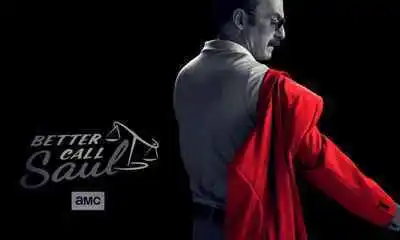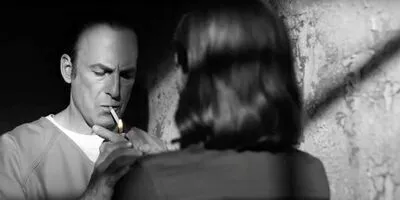Better Call Saul
The series finale of Better Call Saul is about time and regrets
| Published: | 2023-05-12 |
| Updated: | 2024-09-03 |
| Words: | 1549 |
| Tags: | #tv |
I've been watching Better Call Saul over the past 6 months and finally finished it last night. I wanted to analyze the series finale. I really liked it.
It's about time—past, present, and future—and, as Walter makes clear, regrets. We finally learn why the Saul of the present is in black-and-white, and the two timelines—the colored past and the black-and-white present—finally meet.
The episode starts in the present with Saul running from the police in Nebraska. He jumps in a dumpster to hide, and, while he waits, he reflects.
What Mike Would Do with a Time Machine
He recalls the time he was stuck in the desert with Mike and 7 million dollars. He asks Mike what he would do if he had a time machine, thinking that Mike might say something about history. Mike chuckles a bit and says November 11, 2000 (or some exact date in 2000). He then catches himself and says, "No, March 7, 1984. The day I took my first bribe."
The first date the Mike gave was the day his son was murdered, a date that has plagued Mike's mind everyday since. Why? What would he do on this date? Well, save his son, obviously. But he quickly realizes that there is another way to save his son (and himself). By taking bribes and going down the wrong path, Mike realized that he was partly responsible for his son's death.
What Saul Would Do with a Time Machine
Saul also gives an exact date - a date in 1965 that no one would be too familiar with. He explains that it was the date that Warren Buffet started Berkshire Hathaway. Saul would invest his money in Buffet's newly formed investment company, and, by the time the 2000s rolled around, he'd be a billionaire. Wait, "is there such thing as a trillionaire?"
That's it? It's all just money to you?
What Walter Would Do with a Time Machine
After bickering about the scientific implausibility of a time machine, Walter finally says, "Regrets. What you're asking about is regrets. If you're asking about regrets, then just ask and don't give me all this B.S. about a time machine."
Walter talks about the (now, extremely valuable) company that he was a co-founder for. Walter said that it was a company started to sell his own ideas, and that he left because he wanted to. But he realizes now that his co-founders were discretely trying to push him out. Ostensibly, so that they could take his share of the company's future profits.
I'm not sure how much sense this makes. How could they be so sure that the company would turn a huge profit while Walter was completely ignorant of the fact? I think Walter's greed and lust for revenge were getting to his head.
If Walter had a time machine, he'd get revenge. And make a lot of money along the way.
What Chuck Would Do with a Time Machine
There's a flashback where Jimmy is bringing food (and correctly bringing Fuji apples) to Chuck. Chuck asks Jimmy why he's doing it. They could easily get someone from the firm to do it, instead. Jimmy says, "Because you're my brother."
Chuck was touched by this. In his first display of humanity in the whole series, he asks Jimmy if he'd like to stay and talk for a bit. Incredulous, Jimmy asks why, mentioning all of his lowlife clients and asking Chuck if he really wants to hear about them (though, Chuck obviously just wanted to talk with his brother).
Chuck responds that they still have a right to the best legal council possible. Jimmy continues mentioning other lowlifes he's representing and tells Chuck, "You just wanna tell me how I'm wrong." Jimmy leaves. "And hopefully tomorrow I'll have The Financial Times with me." Jimmy can be the best food and goods delivery person ever, but he can't talk with his brother.
After Jimmy leaves, Chuck picks up a copy of H.G. Well's The Time Machine from the counter. Chuck has regrets, and if he had a time machine, he'd fix his relationship with his brother. He'd treat him better. He'd "talk" with him.
In fact, the whole flashback with Chuck was, essentially, a time machine visit. As if Chuck were coming back from the grave to say he's sorry and, in the process, warn Jimmy:
You know, Jimmy, if you don't like where you're headed, you can always change.
The Meaning of Color in the Series
Saul Goodman is known for his bright, eccentric color choices. These are mostly reflected in his clothes, but also in his ads and commercials, and we briefly, in a prior episode, see a glimpse of his mansion built on ill-gotten wealth. He has a golden toilet in a golden bathroom.
The present is black-and-white because Saul Goodman is over. His flashy suits don't work in black-and-white. He wore one of his suits to a hearing. You could vaguely make it out from the sheen of his suit sleeves. But that was all you could see without color.

He tries, in vain, to revive his former self. He tells a sob story of how he was forced into helping Walter White, only to tell the prosecutors that he only needs one juror to believe this story.
Scared, they cut him a deal. Only seven years. He's done it again! Or has he? He has one last carrot—the truth about Howard Hamlin's death. The prosecutors grin and tell him that Kim has already signed an affidavit stating exactly what happened. She opened herself up to a civil suit, possibly loosing everything she had and will ever have. All to do what's right. To fix her regrets.
"Saul Gone"
Saul Goodman is no more. At his court hearing to discuss his plea deal ("the most generous in history" according to the judge), he begins the sob story that he told the prosecutors. It starts out the same, but he changes it. He tells the truth. Walter did threaten him, but Saul saw opportunity and lots and lots of cash. He tells the truth about what happened to Howard and how he got Chuck's malpractice insurance rate to go up, inadvertently leading to his suicide.
In admitting to everything, Jimmy McGill kills Saul Goodman. He even asks the judge to start referring to him as Jimmy McGill.
And it was an apology to Kim. She was there in the courtroom. Jimmy created a ruse to get her there, stating in front of a federal agent that he had testimony that concerned her.
Jimmy doesn't pay much attention to anything in the courtroom after his apology. He just looks back at Kim. He realized that this is what she would have done in his situation, and this is what is most important to him, not the seven years of jail time that he now has increased to 86.
The show cuts to a scene of a dough making machine. At first, the viewer believes it to be the one from Cinnabon that appeared in so many other episodes, but as the camera zooms out, we see that Jimmy is now baking bread in the prison kitchen. As if to say that he was doomed from the beginning.
Kim comes to visit him. This is where we learn that Jimmy's sentence increased from 7 years to 86. They share a cigarette like old times. But the flame is colored unlike the rest of the scene. The two timelines, past and present, have finally met.
What Kim Would Do with a Time Machine
Jimmy never asks her. She doesn't need one. She has regrets like everyone else, but unlike everyone else, she fixed hers. Luckily, Jimmy learned from her example and did the same. That's why the timelines meet when she visits him in prison. Kim doesn't need a time machine—she is the time machine. She realized that the point is not to fix the past but to fix the present.
